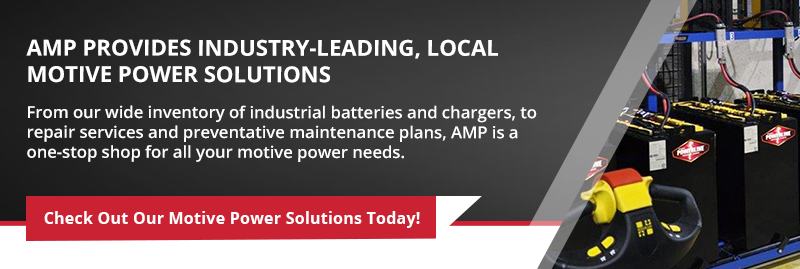Electric Forklift Throw-Down: Lithium-Ion vs Lead-Acid Batteries
Who would have ever believed that lithium-ion batteries would be such a popular source of power? Lithium-ion batteries power everything from cell phones and laptops to tablets and other computer electronics. Lithium-ion batteries offer high-density storage and on average, store about three times the energy of a comparable lead-acid battery. So why are they not in every new electric forklift truck on the market?
Many in the material handling equipment industry are wondering if industrial grade lithium-ion batteries will become the standard. The very first generation of industrial lithium-ion forklift batteries were being used in experimental lift trucks a decade ago.
Although lithium-ion forklift batteries have risen in popularity, the very attributes that make lithium-ion batteries so pervasive in the electronics industry are the main reasons they are not being adopted in the material handling industry. They are lightweights. Literally.
According to the Industrial Truck Association, counterbalanced forklifts are the most common industrial lift truck on the market, capturing about 57% of the total lift truck market. Counterbalanced forklifts are seen in many warehousing, manufacturing and construction applications.
Lithium-ion batteries weigh virtually nothing when compared to a traditional lead-acid battery. Being so lightweight is what makes lithium-ion perfect for consumer electronics. However, this has led to a problem integrating lithium-ion into traditional counterbalanced forklift fleets currently powered by lead-acid batteries.
Preventing tip overs is a huge safety initiative in the material handling industry. Having a lightweight battery without the sufficient ballast required for counterbalanced forklifts increases the risk of tipping over when lifting loads.
If forklift manufacturers produced a counterbalanced lift truck designed specifically for lithium-ion electrical systems, thousands of pounds of useless ballast would have to be added to each unit. Adding dead weight is not a cost effective or environmentally friendly solution.
In addition, forklift manufacturers are tooled up to provide equipment with lead-acid batteries and necessary ballast. Businesses utilizing forklifts have also become proficient in maintaining a forklift fleet of high performance lead-acid batteries.
Nevertheless, lithium-ion batteries for material handling equipment aren’t wrong; it’s just currently not the best solution. To be clear, lithium-ion does offer many great advantages for the material handling equipment industry. They are perfectly suited for all equipment that does not rely on ballast as an essential design element like pallet trucks, walkie trucks and aerial lifts.
Lithium-ion batteries charge faster, don’t emit potentially harmful gases while charging and do not require cool-down interval used in charging lead-acid batteries. These are all enticing benefits. However, for now it seems lead-acid is the mainstay, even given that the watt-per hour cost of lithium-ion is five times that of lead-acid. We will have to see major changes from the forklift manufacturers before lithium-ion surpasses the revered traditional lead-acid forklift battery.
Here at Southern States Motive Power, we are industrial forklift battery experts in Tampa, Orlando, Jacksonville and more. We carry industry leading brands like HAWKER, whose forklift batteries deliver a level of performance and reliability unmatched by any in the industry. We are experts in battery handling technologies. With batteries, chargers, parts, accessories and systems installations, make sure you talk with a Southern States Motive Power battery expert if you are in the market for traditional lead-acid batteries, lithium-ion batteries and battery handling charging systems to power your business forward.






